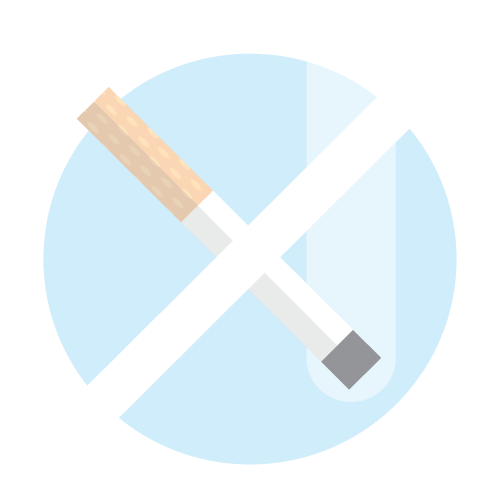
Pregnancy guide
SMOKING AND PREGNANCY
When you or the people around you smoke, your baby smokes too. A smoke-free environment is best for both you and your developing baby. When you smoke, your baby gets less oxygen and nutrients. This can cause your baby to grow more slowly and gain less weight in your womb. Babies with a lower-than-average birth weight tend to have more health problems. And the more you smoke, the higher the risk that your baby will have complications during the perinatal period. This is true for babies exposed to second-hand smoke too.
Cigarette smoking exposes your baby to over 4.000 chemicals found in tobacco smoke. Fifty of theses are associated with cancer.
Exposure to tobacco smoke affects your baby for life. Your baby may have learning problems, more ear infections and more colds and breathing problems. Being born small can affect your baby’s health into adulthood.
Smoking during pregnancy will increase the risks to your own health too. For example, you have a greater chance of having a miscarriage than a non-smoker. During the birth, you are more likely to have complications.
Second-hand smoke is just as bad. Second-hand smoking contains the same toxic chemicals and carcinogens that smoker inhale. Children regularly exposed to second-hand smoke are at least fifty per cent more likely to suffer damage to their lungs and to develop breathing problems such as asthma. When you breath in second-hand smoke, you have a greater risk of developing lung cancer, heart disease, breathing problems and irritation of the eyes, lungs and throat.
Yes. All tobacco smoke is bad for you and your baby. The sooner you quit completely, the better.
Yes, but they are lucky. Smoking during pregnancy is a gamble that puts your child at risk.
It is possible that if you stop smoking you may eat more to replace your oral habit. Chewing sugar-free gum might help. If you do gain a few pounds, don’t worry. Being physically active and making healthy food choices will help you lose the extra weight after your baby is born. You’ll also feel great knowing you gave your baby the best possible start in life.
The best choice for you and your baby is to stay smoke-free.
If you start smoking again, you are putting your baby at risk from the harmful effects of second-hand smoke and your own health at risk from the effects of smoking.
By staying smoke-free you’re protecting both you and your baby from the harmful effects of tobacco smoke.
Some people find that picking a quit day helps. On that day, you throw away your cigarettes, lighters, matches and ashtrays. In anticipation of the quit day, you can reduce the number of cigarettes you smoke per day. Set a limit and stick to it.
When you feel the urge to smoke, try chewing gum, eating a piece of fruit, calling a friend or going for a walk.
Stop-smoking support groups may also help.

